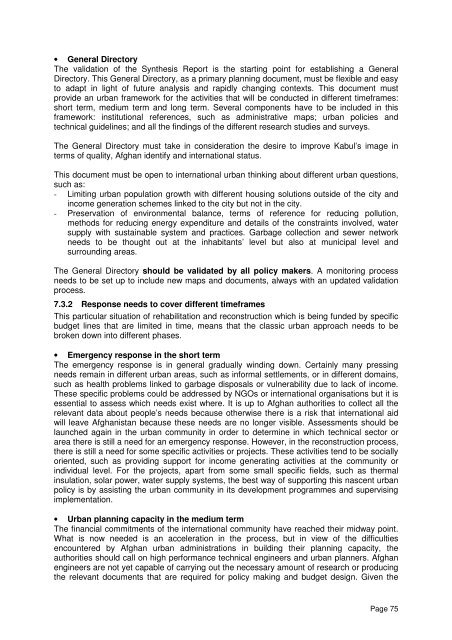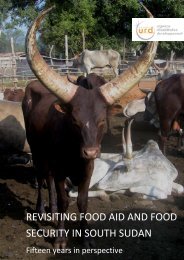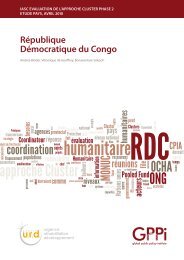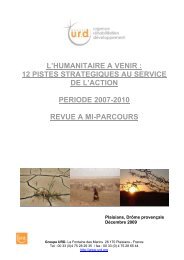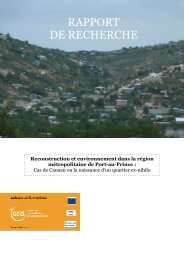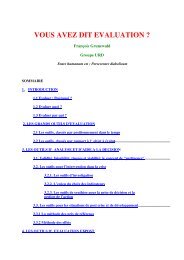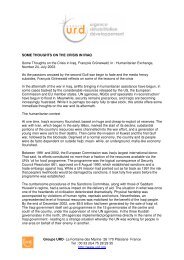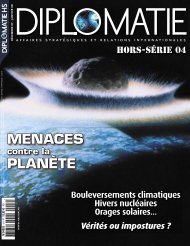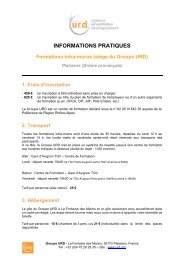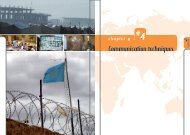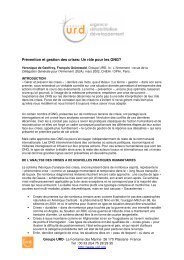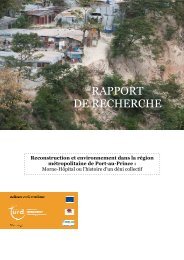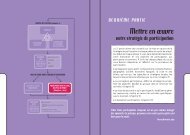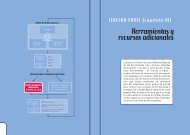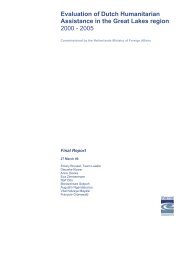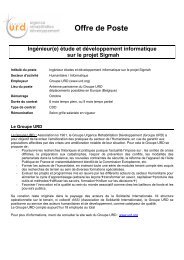Kabul Urban Survey - Groupe URD
Kabul Urban Survey - Groupe URD
Kabul Urban Survey - Groupe URD
You also want an ePaper? Increase the reach of your titles
YUMPU automatically turns print PDFs into web optimized ePapers that Google loves.
• General Directory<br />
The validation of the Synthesis Report is the starting point for establishing a General<br />
Directory. This General Directory, as a primary planning document, must be flexible and easy<br />
to adapt in light of future analysis and rapidly changing contexts. This document must<br />
provide an urban framework for the activities that will be conducted in different timeframes:<br />
short term, medium term and long term. Several components have to be included in this<br />
framework: institutional references, such as administrative maps; urban policies and<br />
technical guidelines; and all the findings of the different research studies and surveys.<br />
The General Directory must take in consideration the desire to improve <strong>Kabul</strong>’s image in<br />
terms of quality, Afghan identify and international status.<br />
This document must be open to international urban thinking about different urban questions,<br />
such as:<br />
- Limiting urban population growth with different housing solutions outside of the city and<br />
income generation schemes linked to the city but not in the city.<br />
- Preservation of environmental balance, terms of reference for reducing pollution,<br />
methods for reducing energy expenditure and details of the constraints involved, water<br />
supply with sustainable system and practices. Garbage collection and sewer network<br />
needs to be thought out at the inhabitants’ level but also at municipal level and<br />
surrounding areas.<br />
The General Directory should be validated by all policy makers. A monitoring process<br />
needs to be set up to include new maps and documents, always with an updated validation<br />
process.<br />
7.3.2 Response needs to cover different timeframes<br />
This particular situation of rehabilitation and reconstruction which is being funded by specific<br />
budget lines that are limited in time, means that the classic urban approach needs to be<br />
broken down into different phases.<br />
• Emergency response in the short term<br />
The emergency response is in general gradually winding down. Certainly many pressing<br />
needs remain in different urban areas, such as informal settlements, or in different domains,<br />
such as health problems linked to garbage disposals or vulnerability due to lack of income.<br />
These specific problems could be addressed by NGOs or international organisations but it is<br />
essential to assess which needs exist where. It is up to Afghan authorities to collect all the<br />
relevant data about people’s needs because otherwise there is a risk that international aid<br />
will leave Afghanistan because these needs are no longer visible. Assessments should be<br />
launched again in the urban community in order to determine in which technical sector or<br />
area there is still a need for an emergency response. However, in the reconstruction process,<br />
there is still a need for some specific activities or projects. These activities tend to be socially<br />
oriented, such as providing support for income generating activities at the community or<br />
individual level. For the projects, apart from some small specific fields, such as thermal<br />
insulation, solar power, water supply systems, the best way of supporting this nascent urban<br />
policy is by assisting the urban community in its development programmes and supervising<br />
implementation.<br />
• <strong>Urban</strong> planning capacity in the medium term<br />
The financial commitments of the international community have reached their midway point.<br />
What is now needed is an acceleration in the process, but in view of the difficulties<br />
encountered by Afghan urban administrations in building their planning capacity, the<br />
authorities should call on high performance technical engineers and urban planners. Afghan<br />
engineers are not yet capable of carrying out the necessary amount of research or producing<br />
the relevant documents that are required for policy making and budget design. Given the<br />
Page 75


